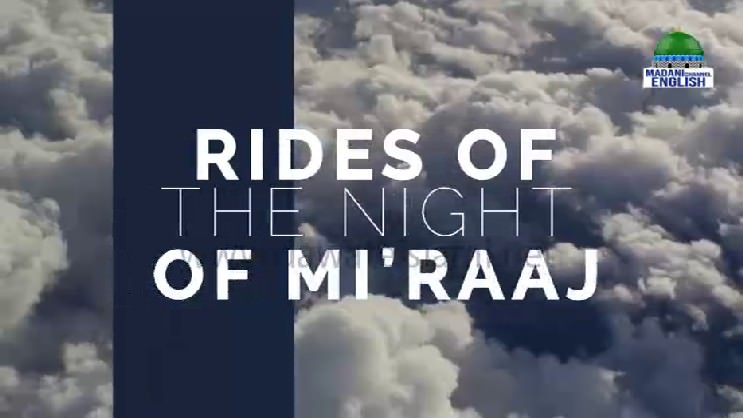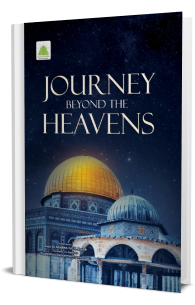Sorrowful facets of the Night of Miʿrāj
Mawlana Umar Fiyaz Attari Madani
The Night of the Miʿrāj holds a special rank in Islamic history. It is the night in which the Greatest Prophet صَلَّى اللهُ عَلَيْهِ وَاٰلِهٖ وَسَلَّم received a status that none of the Prophets before him received. On this auspicious night, he صَلَّى اللهُ عَلَيْهِ وَاٰلِهٖ وَسَلَّم travelled from Masjid al-Ḥarām, to Masjid Al-Aqṣā, and to Qāba Qawsayn. He صَلَّى اللهُ عَلَيْهِ وَاٰلِهٖ وَسَلَّم saw all the marvels of the heavens and earth, the blessings in Paradise, and the punishments in Hell. Most significantly, he even beheld Allah Himself. During the Miʿrāj , the Prophet صَلَّى اللهُ عَلَيْهِ وَاٰلِهٖ وَسَلَّم was saddened when he saw sinners being punished in Hell. What were these punishments? Who was punished and why? Let us discuss this.
Overview of Hell
Imām al-Bayhaqi writes:
After the Greatest Prophet صَلَّى اللهُ عَلَيْهِ وَاٰلِهٖ وَسَلَّم traversed the seven heavens, Sidrat al-Muntahā, the ʿArsh of Allah, lā makān, and Paradise, he then inspected Hell. He was in Paradise when the veils of Hell were lifted, causing him to see the latter’s seven levels. After the veil returned, the Prophet صَلَّى اللهُ عَلَيْهِ وَاٰلِهٖ وَسَلَّم returned to Sidrat al-Muntahā, and the return journey began there.[1]
Witnessing varying punishments
The Prophet صَلَّى اللهُ عَلَيْهِ وَاٰلِهٖ وَسَلَّم saw people being severely punished in Hell. He صَلَّى اللهُ عَلَيْهِ وَاٰلِهٖ وَسَلَّم conveyed what he saw to his nation, to inspire them to fear Allah, become pious, and save themselves from these devastating penalties.
The punishment for not performing salah
After accepting Islam, the most important obligation is the fulfilment of salah. This is an important pillar from the five pillars of Islam, and the most superior physical form of worship. Noble Quran and Hadith profoundly highlight its significance, and contain warnings for those who abandon it.
During the Miʿrāj journey, the Prophet صَلَّى اللهُ عَلَيْهِ وَاٰلِهٖ وَسَلَّم saw people whose heads were being crushed with stones. Their heads would heal before being crushed again. There was no respite in this matter. The Prophet صَلَّى اللهُ عَلَيْهِ وَاٰلِهٖ وَسَلَّم asked Angel Jibrīl عَـلَيْـهِ الـسَّـلاَم, “Who are these people?” Jibrīl replied, “These are the people who considered salah a burden.”[2]
The punishment for monetary interest
Interest is forbidden in Islam, as not only does lead to exploitation, greed, selfishness, and other evils, it is also a cause of social and economic disasters. This is why the noble Quran and Hadith prohibit interest being taken or given.
The Companion Abū Hurayrah رَضِىَ اللّٰهُ عَـنْهُ reports that the Beloved Prophet صَلَّى اللهُ عَلَيْهِ وَاٰلِهٖ وَسَلَّم said, “During the Night of Miʿrāj, I saw people with stomachs like houses (large in size), with snakes within them that could be seen from outside. ‘O Jibrīl!’, I asked, ‘Who are they?’ He replied, ‘They are usurers.’”[3]
The Holy Prophet صَلَّى اللهُ عَلَيْهِ وَاٰلِهٖ وَسَلَّم further states:
We continued onwards until coming to a river as red as blood. A person swam within, whilst another stood on the riverbank with stones in front of him. Whenever the person in the river attempted to exit, the other threw a stone at his face, sending him back to his place. Upon asking, I was told he (the person in the river) is a usurer.[4]
Backbiters and faultfinders
Backbiting a Muslim is a major sin. In the noble Quran, Allah Almighty has likened the backbiter to eating the flesh of their dead brother, and the Beloved Prophet صَلَّى اللهُ عَلَيْهِ وَاٰلِهٖ وَسَلَّم said it is worse than fornication. In another narration, the Holy Prophet صَلَّى اللهُ عَلَيْهِ وَاٰلِهٖ وَسَلَّم looked into Hell and saw people eating corpses. He صَلَّى اللهُ عَلَيْهِ وَاٰلِهٖ وَسَلَّم asked Jibrīl عَـلَيْـهِ الـسَّـلاَم who they were, to which the angel said, “They are the people who ate the flesh of others (i.e. they would backbite).”[5]
On the Night of Miʿrāj, the Prophet صَلَّى اللهُ عَلَيْهِ وَاٰلِهٖ وَسَلَّم saw people who were appointed over others. Some of them opened the jaws of people, whilst others cut their flesh and stuffed it in their mouths along with their blood. The Prophet صَلَّى اللهُ عَلَيْهِ وَاٰلِهٖ وَسَلَّم asked, “O Jibrīl! Who are these people?” He replied, “They would backbite and find faults in people.”[6]
In another report, backbiters were made to eat the flesh of their own bodies. It was said to them, “Eat, just as you ate the flesh of your brother.”[7]
Preachers who do not act upon what they preach
The Beloved Prophet صَلَّى اللهُ عَلَيْهِ وَاٰلِهٖ وَسَلَّم always acted upon what he commanded others to do. The noble Quran condemns preachers who live as religious and moral pillars of society but fail to act upon the guidance they give.
Allah Almighty announces:
یٰۤاَیُّہَا الَّذِیْنَ اٰمَنُوْا لِمَ تَقُوْلُوْنَ مَا لَا تَفْعَلُوْنَ (۲) کَبُرَ مَقْتًا عِنْدَ اللّٰہِ اَنْ تَقُوْلُوْا مَا لَا تَفْعَلُوْنَ (۳)
O you who believe! Why do you say that which you do not do? It is extremely undesirable in the Court of Allah that you say that which you do not do.[8]
The final Prophet صَلَّى اللهُ عَلَيْهِ وَاٰلِهٖ وَسَلَّم also saw these preachers in Hell.
He صَلَّى اللهُ عَلَيْهِ وَاٰلِهٖ وَسَلَّم said, “During the Night of Miʿrāj, I saw people whose lips were being cut with scissors made of fire. Every time they were cut, they would heal.” Upon asking about them, it was said, “These are the orators of your nation. They never acted upon what they preached, and they read the noble Quran but did not act upon it.”[9]
Disobeying parents
Everyone with intellect agrees that because the holy Quran prohibits one from saying “uff” to their parents. Hitting or swearing at them is then an extremely severe sin. On the Night of Miʿrāj, the Prophet صَلَّى اللهُ عَلَيْهِ وَاٰلِهٖ وَسَلَّم saw people in Hell hanging from branches of fire. The Prophet صَلَّى اللهُ عَلَيْهِ وَاٰلِهٖ وَسَلَّم asked, “O Jibrīl! Who are these people?” He answered, “These are the people who swore at their parents in the world.”[10]
Not paying zakat
Those who did not pay zakat were seen in Hell with rags around them, eating the foul-smelling and bitter grass therein like animals.[11]
Taking the wealth of orphans
Those who oppressed orphans by taking their wealth had lips like camels. People were assigned to grab their lips and place blazing stones of fire into their mouths, which would leave their bodies from behind.[12]
Faultfinders and mockers
Men and women who would find faults in others were seen hanging from their chests.[13]
Adulterous men and women
Women who fornicated and killed their children were seen hanging from their chests or feet.[14]
Adulterous men and women were seen imprisoned with snakes and scorpions. The latter were stinging the prisoners, and each sting injected a poison, causing their private parts to release pus, the foul smell of which caused the inmates of Hell to scream in horror.[15]
The wisdom of witnessing Heaven and Hell
It is said that on the Day of Judgement when Heaven and Hell are visible, people will look at Heaven and desire to attain it. They will be fearful when looking at Hell. Prophets and Messengers عَـلَـيْهِمُ السَّلَام will say نفسی نفسی. This is because, this will be the first time all people, including Prophets and Messengers, will have seen Heaven and Hell. Yet, the Holy Prophet صَلَّى اللهُ عَلَيْهِ وَاٰلِهٖ وَسَلَّم will have already seen all of this. He صَلَّى اللهُ عَلَيْهِ وَاٰلِهٖ وَسَلَّم will then intercede for his nation, saying اُمتی اُمتی.
Dear readers! You read about some of the causes of entering Hell and the punishments therein. If we are intellectual and identify any of the causes within ourselves, we must refrain from them immediately and strive to avoid Hell and its punishments.
[1] Dalāˈil al-Nubuwwa, vol. 2, p. 394
[2] Musnad Bazzār: Hadith 9518
[3] Sunan Ibn Mājah: Hadith 2283
[4] Majmaʿ al-Zawāˈid: Hadith 235
[5] Musnad Imām Aḥmad: Hadith 2366
[6] Musnad Ḥārith: Hadith 27
[7] Sunan Abī Dāwūd: Hadith 4878
[8] Al-Quran, Al-Ṣaff, verses 2-3; translation from Kanz al-ꜤIrfān
[9] Shuʿab al-Īmān: Hadith 1773
[10] Al-Zawājir, vol. 2, p. 1125
[11] Al-Tadhkira, p. 134
[12] Tafsīr Qurṭubī, Al-Nisāˈ, under verse 10, vol. 3, p. 39
[13] Shuʿab al-Īmān: Hadith 6750
[14] Tafsīr Ṭabarī, Al-Isrāˈ, under verse 8, vol. 1, p. 13, Hadith 22023
[15] Qurrat al-ʿUyūn, p. 389


















Comments